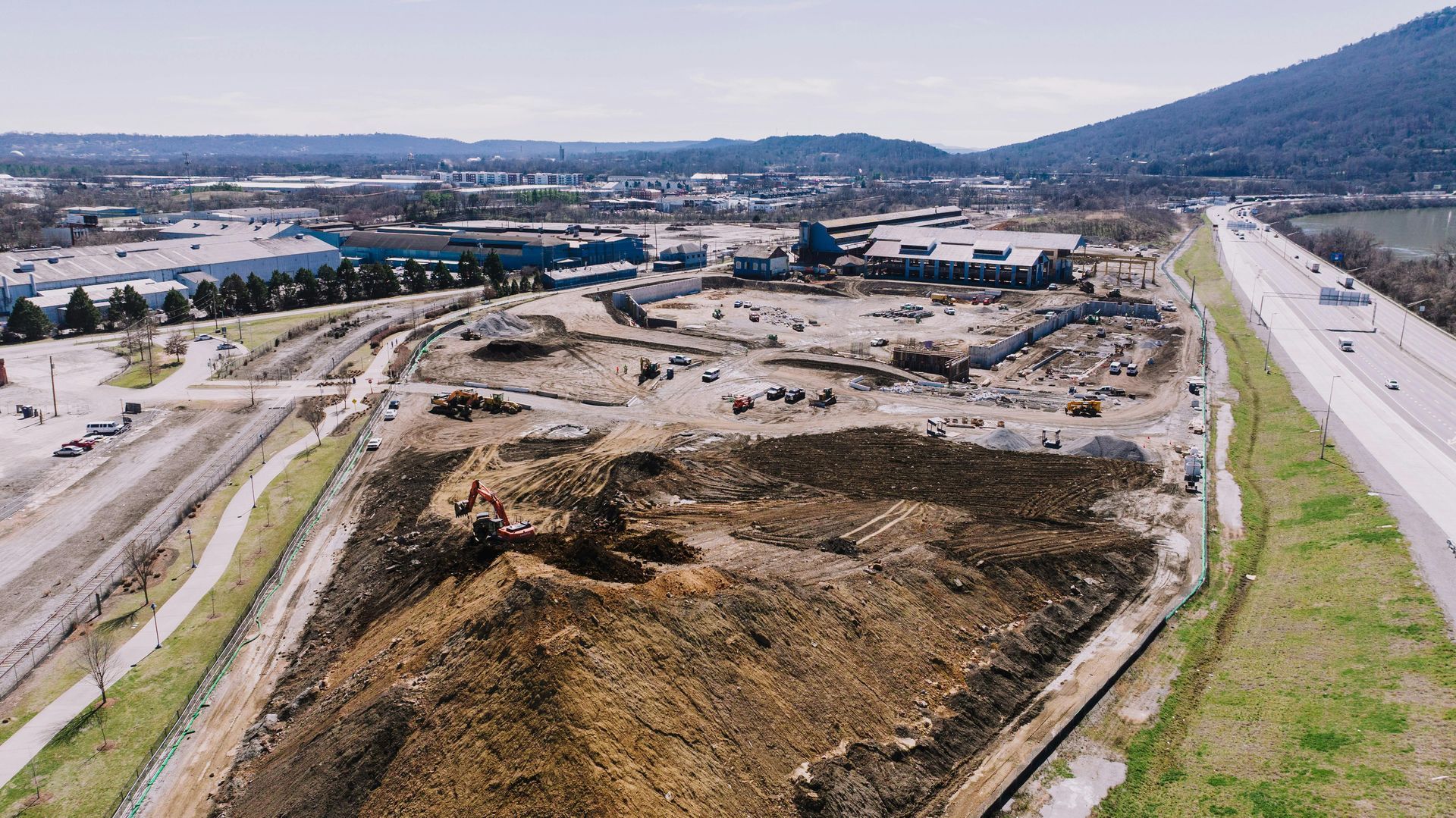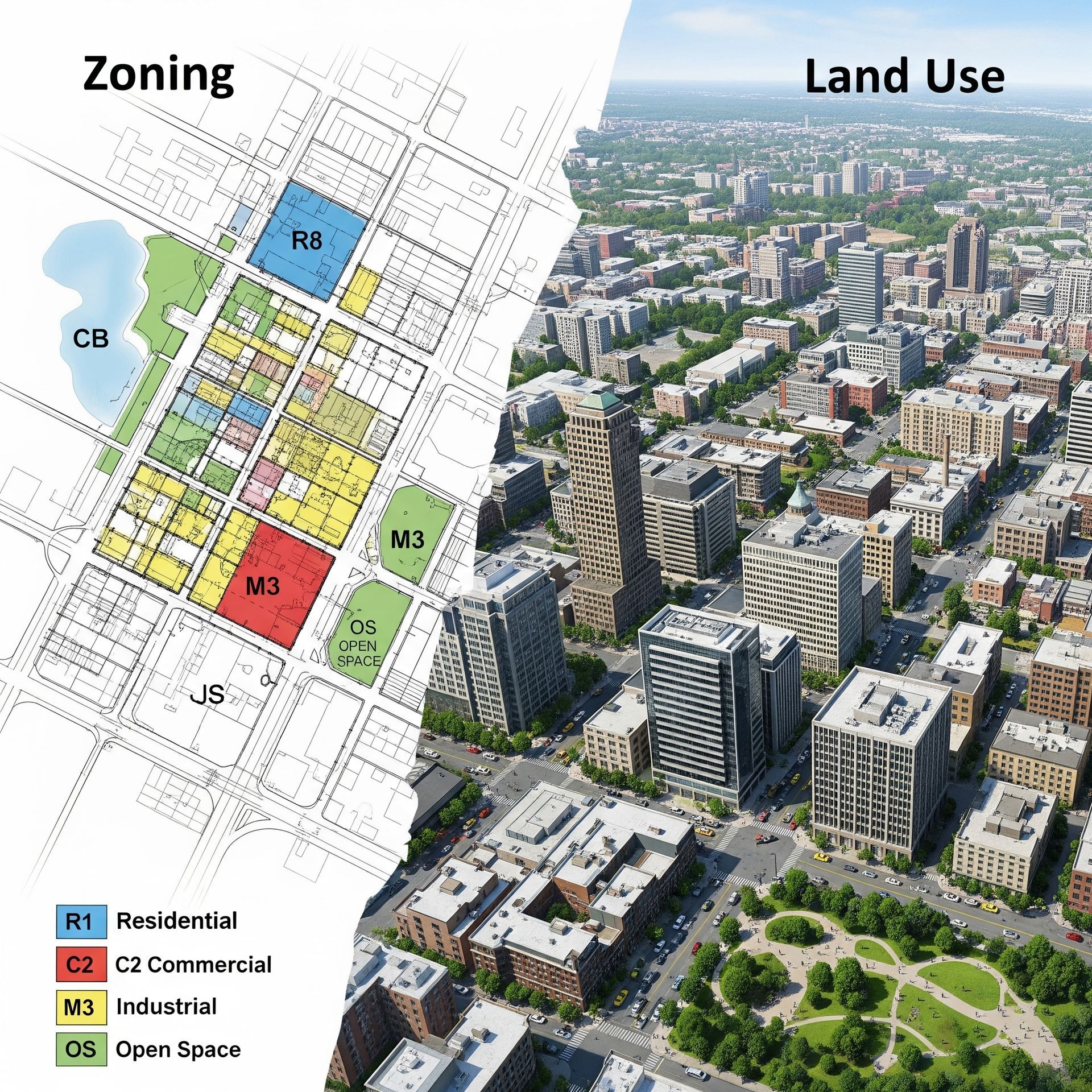Zoning Laws in Houston: A Quick Guide for Landowners
Houston doesn’t play by the usual zoning rulebook—no strict zoning laws here, just flexible guidelines that mix homes, shops, and even factories in one spot. You’ll find different zones for single-family homes, apartments, businesses, and industry, plus special permits if you want to do something a bit different. It’s all about balancing your plans with the neighborhood vibe, and a little chat with the Planning Department goes a long way. Stick around, and you’ll get the hang of making your space work just right by understanding Houston’s unique service areas.
Key Takeaways
- Houston lacks traditional zoning laws, using deed restrictions and community input for flexible land use and development.
- Zoning districts include residential (single-family, multi-family), commercial, and industrial, each with specific use and building regulations.
- Property zoning classification affects development potential; check Houston’s zoning maps or consult the Planning Department for accurate information.
- Conditional Use Permits (CUPs) allow exceptions to zoning rules, requiring application and city approval based on community impact.
- Engage early with the Planning Department and local neighbors to gather support and ensure smooth zoning approval processes.
Understanding Houston’s Unique Zoning Structure
Even though most big cities have strict zoning laws, Houston stands out because it doesn’t follow the usual playbook. You see, Houston’s zoning history is unlike many places—it actually doesn’t have traditional zoning laws at all. This might sound wild, but it’s part of what shapes the city’s unique vibe. Instead of strict zoning, urban development here relies more on deed restrictions, building codes, and community input. So, when you look around, you’ll notice a mix of homes, businesses, and even industrial spots all cozying up next to each other. This creates a lively, diverse environment where you really feel part of a tight-knit community. It’s like the city’s saying, “Hey, we trust you to make smart choices about your space.” If you’re new around here, understanding this unique setup helps you see why Houston feels so welcoming and flexible, compared to the cookie-cutter rules you find elsewhere. For a deeper dive, check out the differences between zoning and land use.
Types of Zoning Districts in Houston
Now that you know how Houston’s zoning works, let’s talk about the main types of zoning districts you’ll find around town. You’ve got residential areas where people live, and then commercial and industrial zones where businesses and factories set up shop. It’s kind of like how your neighborhood and your favorite shopping spot have different vibes and rules to keep things running smoothly.
Residential Zoning Areas
Houston’s planning and development shape how neighborhoods look and feel, making sure homes fit nicely within their surroundings. When you’re looking at a spot for your next home or project, you’ll notice zones for single family homes and others for multi family dwellings. Single family zones keep things cozy, with houses designed for one family—perfect if you love that quiet, close-knit vibe. Multi family zones, on the other hand, allow apartments or duplexes, which means more neighbors and a livelier atmosphere. Knowing the difference helps you find a community where you truly belong, whether you want peaceful streets or a bit more buzz. It’s all about matching the right space to your lifestyle, so you feel at home from day one.
Commercial and Industrial Zones
Commercial and industrial zones are the backbone of Houston’s bustling business scene. When you’re diving into these areas, understanding the rules is key. You’ll need to secure the right commercial permits and follow industrial regulations to keep things running smoothly. Here’s the lowdown:
- Commercial zones focus on shops, offices, and restaurants—perfect if you want to open a business or expand one.
- Industrial zones deal with manufacturing, warehouses, and heavy equipment, so safety and regulations are extra important.
- Mixed-use areas let you combine living and working spaces, blending community vibes with commerce.
If you want to learn more about the benefits of having a zoning expert in Houston, see this detailed post.
How to Check Your Property’s Zoning Classification
Before you plunge into any big plans for your property, it’s a smart move to find out its zoning classification. This info tells you what you can and can’t do with your land, so you’re not caught off guard later. Start by checking out Houston’s zoning maps online—they’re like treasure maps showing all the zoning areas. You’ll just need your property’s address or legal description. If you want to get super precise, pull out your property surveys. These show exact boundaries and details that help match your land to the right zone on the map. If the online maps feel confusing, don’t worry—Houston’s Planning and Development Department is pretty helpful. Give them a call or swing by, and they’ll guide you through the process. Knowing your zoning classification makes you part of the local landowner crew, ready to make smart, informed choices. It’s a simple step that saves headaches and keeps you in the know. For professional assistance, explore due diligence services.
Restrictions and Allowances for Residential Zones
Even though you might just want to plant a garden or build a cozy deck, zoning rules have a say in what you can do with your home. In Houston’s residential zones, understanding restrictions helps you avoid surprises and keeps your neighborhood happy. Here are three key things to keep in mind:
- Setback requirements: These rules tell you how far your structures must be from property lines. Think of it as giving your neighbors some breathing room—no one wants a deck right on their doorstep!
- Density limits: These control how many homes or units can fit in a particular area. It’s about keeping your community comfortable and not overcrowded.
- Use allowances: Residential zones usually allow single-family homes, but some areas might also permit duplexes or accessory buildings, like a guest house.
Commercial and Industrial Zoning Rules
When it comes to commercial and industrial zoning in Houston, you’ll find there are specific rules about what businesses can set up shop where. The city breaks these zones into different categories, each with its own list of do’s and don’ts. Stick with me, and I'll help you navigate the basics so you don’t accidentally open a factory next to a cupcake shop!
Permitted Uses Overview
Since zoning rules can feel like a maze, understanding what you’re allowed to do in commercial and industrial areas really helps clear things up. When it comes to land use, Houston keeps it pretty specific, but there’s some wiggle room with zoning variances if your plans don’t fit perfectly.
Here’s a quick rundown of what you can generally expect:
- Retail shops, restaurants, and offices usually fit right in, making your commercial dreams possible.
- Industrial zones welcome manufacturing, warehousing, and distribution centers, perfect for heavy-duty business.
- Some mixed-use developments blend commercial and light industrial uses, giving you flexibility.
Knowing these basics makes you part of the savvy crowd, ready to navigate Houston’s zoning with confidence—and maybe even a little swagger. For professional support in managing these projects, check out project management services.
Zoning District Classifications
Zoning districts in Houston act like neighborhood clubs, each with its own set of rules about what you can build or run there. When it comes to commercial and industrial zones, understanding zoning classification differences is key. Commercial areas welcome shops, offices, and restaurants, creating lively spots where you and your neighbors can meet and shop. Industrial zones, on the other hand, are for factories, warehouses, and heavy-duty work. These differences impact development big time—what works in one spot mightn't fly in another. Knowing which district your land belongs to helps you plan smart, avoid headaches, and join the right “club” for your vision. It’s like picking the perfect neighborhood that fits your style and goals.
Compliance and Restrictions
Even if you’ve got the perfect spot picked out, you’ll need to play by some rules to keep everything running smoothly. When dealing with commercial and industrial spaces, zoning compliance strategies are your best friend. Here’s what you should keep in mind:
- Property Use Restrictions: Know exactly what your land can be used for—no surprises here, or your plans might hit a wall.
- Building Codes and Setbacks: You’ve got to follow rules about how close buildings sit to the street or neighbors. This keeps the area safe and neighbor-friendly.
- Environmental and Safety Regulations: These guarantee your business doesn’t cause harm or hazards, helping you stay a good community member.
The Role of Conditional Use Permits
When you're planning to use land in a way that doesn't quite fit the usual rules, conditional use permits (or CUPs) can be your best friend. Think of a CUP as a special pass that lets you do something a bit different from the usual zoning, but still keeps things safe and friendly for your neighborhood. If your idea fits under “conditional use,” you’ll need to submit a permit application explaining what you want to do and why it won’t harm the community vibe. The city reviews your application carefully, considering how your plan affects traffic, noise, and nearby properties. It’s like getting a thumbs-up from your neighbors before you make a big change.
Tips for Navigating Houston’s Zoning Approval Process
How do you make sure your zoning plans sail smoothly through Houston’s approval process? It’s all about being prepared and knowing a few insider tips.
Here are three zoning application tips that’ll keep you ahead of the game:
- Do Your Homework Early: Understand Houston’s zoning codes and what’s allowed in your area. This saves headaches later and speeds up your approval timeline.
- Stay in Touch with the Planning Department: Regular check-ins help you catch any issues early. Plus, it shows you’re serious, which never hurts.
- Gather Your Community Support: If neighbors back your project, the approval process often goes smoother. Friendly faces at meetings can make a big difference.
Navigating Houston’s zoning approval doesn’t have to be a mystery. With these approval timeline insights and a little planning, you’ll feel like part of the local zoning crew, ready to make your project happen. For expert help, see
plat preparation services or learn
questions to ask before hiring a zoning consultant.
Frequently Asked Questions
How Do Zoning Laws Affect Property Taxes in Houston?
You’ll find that zoning classifications influence your tax assessment by determining your property's use and value. Understanding these can help you join a community that’s informed and proactive about managing property taxes together.
Can Zoning Changes Impact Nearby Property Values?
Zoning changes can ripple through your neighborhood like waves, affecting property appraisal and values nearby. You’ll notice zoning effects shaping your community’s charm, so staying connected helps you protect what makes your home truly yours.
What Are the Penalties for Violating Houston Zoning Laws?
If you commit zoning violations, you’ll face enforcement actions like fines or stop-work orders. Staying informed helps you avoid penalties and keeps you connected with your community’s growth and harmony. You’ve got this!
How Do Zoning Laws Influence Home Renovation Permits?
You’ll want to navigate renovation restrictions carefully, as they gently shape your permit applications. Following these guidelines guarantees your home improvements fit our community’s character, helping you belong while avoiding any unexpected permit hurdles.
Are There Any Exemptions to Houston’S Zoning Requirements?
You’ll find zoning exemptions that protect your landowner rights, letting you make certain improvements without full approval. These help you feel included and empowered while maneuvering through Houston’s zoning rules together with your community.
Final Thoughts
Now that you’ve got the lowdown on Houston’s zoning quirks, you’re better set to handle your land like a pro. Wondering how to turn that idea into reality without getting tangled in rules? Just remember, knowing your zone and when to ask for permits can save you headaches later. So, plunge in with confidence—you’ve got this! And hey, if zoning feels tricky, think of it as Houston’s way of keeping the neighborhood happy and thriving. Ready to get started? Visit our
services page or
contact us today to see how we can help you navigate Houston zoning with ease.


